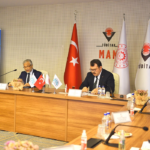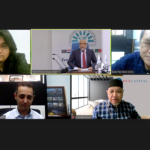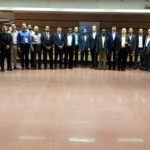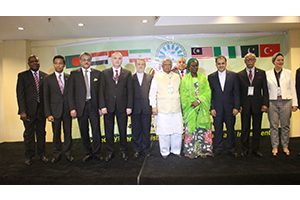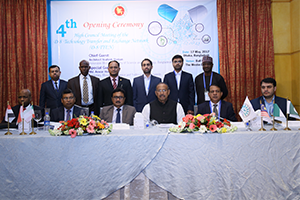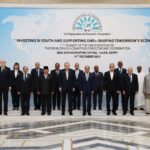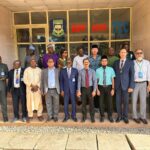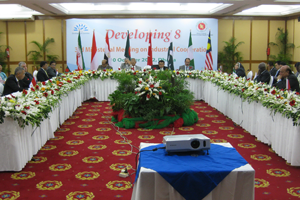
The Third Ministerial Meeting on Industry was held in Dhaka, Bangladesh, during 8-10 October 2012 with the aim of strengthening the multilateral industrial relations amongst the D-8 countries. The 3-day meeting, hosted by the Ministry of Industries of the Peoples Republic of Bangladesh, was attended by Industry Ministers and other high officials, and experts from the member countries, as well by representatives from private sector and local/international NGOs.
During the first two days of the meeting, the representatives of the member countries, including from the private sector, participated in the meetings of the 12 Task Forces in charge of pursuing industrial cooperation in the following areas: automotive, energy, food industry, technology cooperation, petrochemicals, cement, iron/steel, textile, standardization and accreditation, SMEs, electronics and ICT, machinery. The outcome of the work of these Task Forces was reviewed and approved by the Senior Officials Meetings at the end of the 2nd day.
The private sector also had organized three seminars on the sidelines of the Dhaka meeting geared to exploring the existing and potential opportunities for cooperation among the member-countries. The emphasis in the seminars was to explore practical ways and means to augment investment, promote trade, expand technology transfer, enhance collaborative efforts, including in the area of R&D activities, towards unlocking such potentials.
Minister of Industries of Bangladesh, Dilip Barua, said collective efforts on diversification of mutual trade relations, enhanced participation in decision-making at the international and regional level, and providing better standards of living to the common people are the main thrust of D-8. He said the collective economy of D-8 members is integrating rapidly with the global economy. Volumes of export and import, which constitute a significant percent of the world trade, have been on the rise. The GDP growth rate has centred at more than 6 percent on an average among the member states.
D-8 Secretary-General, Widi Pratikto, stated at the inauguration ceremony of the meeting that he was quite optimistic about the prospects of actual cooperation in this field. However, he emphasized the importance and necessity of pursuing by each and every country of a pragmatic approach towards cooperation in industrial sector within the bloc including through improvement of linkages and efficient networking among the entrepreneurs and industrialists. He underlined the necessity of an objective review and assessment of the existing mechanisms for cooperation in the filed, in particular as relates to the work and performance of the Task Forces under the Working Group on Industrial Cooperation (WGIC).
SMEs, an area that appears to have received growing attention and significance in recent years, figured prominently among the sideline activities, in which the D-8 Secretary-General, a number of ministers and high officials and other representatives of the member countries participated. They also participated at a press briefing after the end of the seminar and expressed shared conviction of the importance of SME activities as a critical vehicle to increase the capacity of domestic production in D-8 countries – which would as well help increase D-8 intra-trade and D-8 total trade.
In her inaugural statement opening the Ministerial Segment, Sheikh Hasina, the Prime Minister of Bangladesh, called on the D-8 member countries to strengthen mutual cooperation on trade, culture and human resources development to deal with unprecedented challenges emerging from globalization. The Prime Minister also criticized the multilateral organisations for their traditional focus with the interests of the developed countries and general neglect of the interests of the least developed countries and developing states, and emphasized the imperative of expansion and strengthening of relations between the D-8 and OIC member states to help offset this negative trend. She also encouraged the D-8 to establish formal engagement with the ASEAN and other regional and international organisations that can promote the interests of the D-8 members.
The Dhaka Declaration, adopted at the end of the meeting, encompasses a number of practical proposals and suggestions on a wide array of areas of collaboration, focussing on transfer of technology, institutional capacity building, investment flows, research & development (R&D) activities, and promotion of linkages and networking among entrepreneurs.
The Declaration also emphasized the imperative of further collective collaboration on joint research and development activities in the energy sector, exploring business opportunities in the international markets, reducing technical barriers on trade among the D-8 and expanding the position of the D-8 member-countries in the international markets, developing a process of MRA and harmonisation in the fields of metrology, standardisation, conformity assessment and accreditation among the D-8 member countries.
The Declaration also drew attention to the widely shared view among the participants at the Meeting that D-8 Secretariat needs to be strengthened in terms of both financial and human resources to be able to effectively pursue, follow up and coordinate implementation of the decisions made by the Organization, at different levels, whether in the field of industrial cooperation or in other areas.
Photos from these meetings can be viewed from our gallery, or click here: http://www.flickr.com/photos/developing8/sets/72157631805219026/










